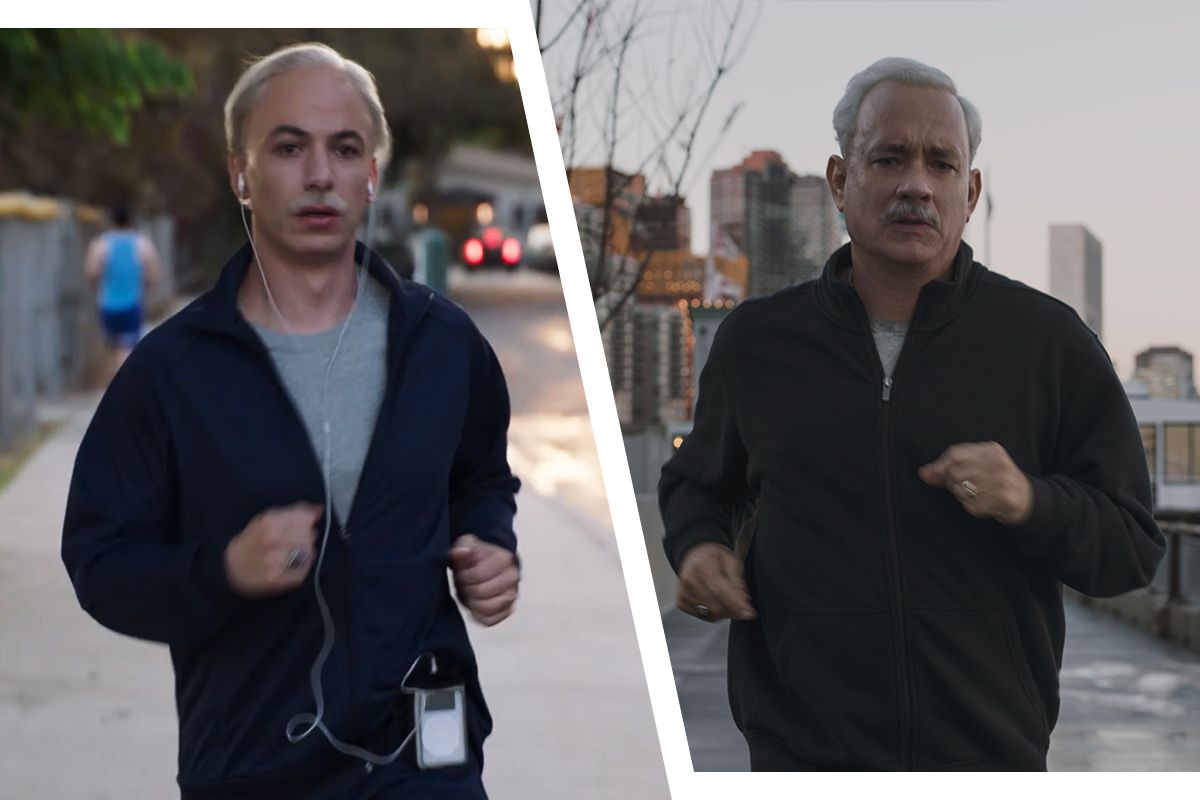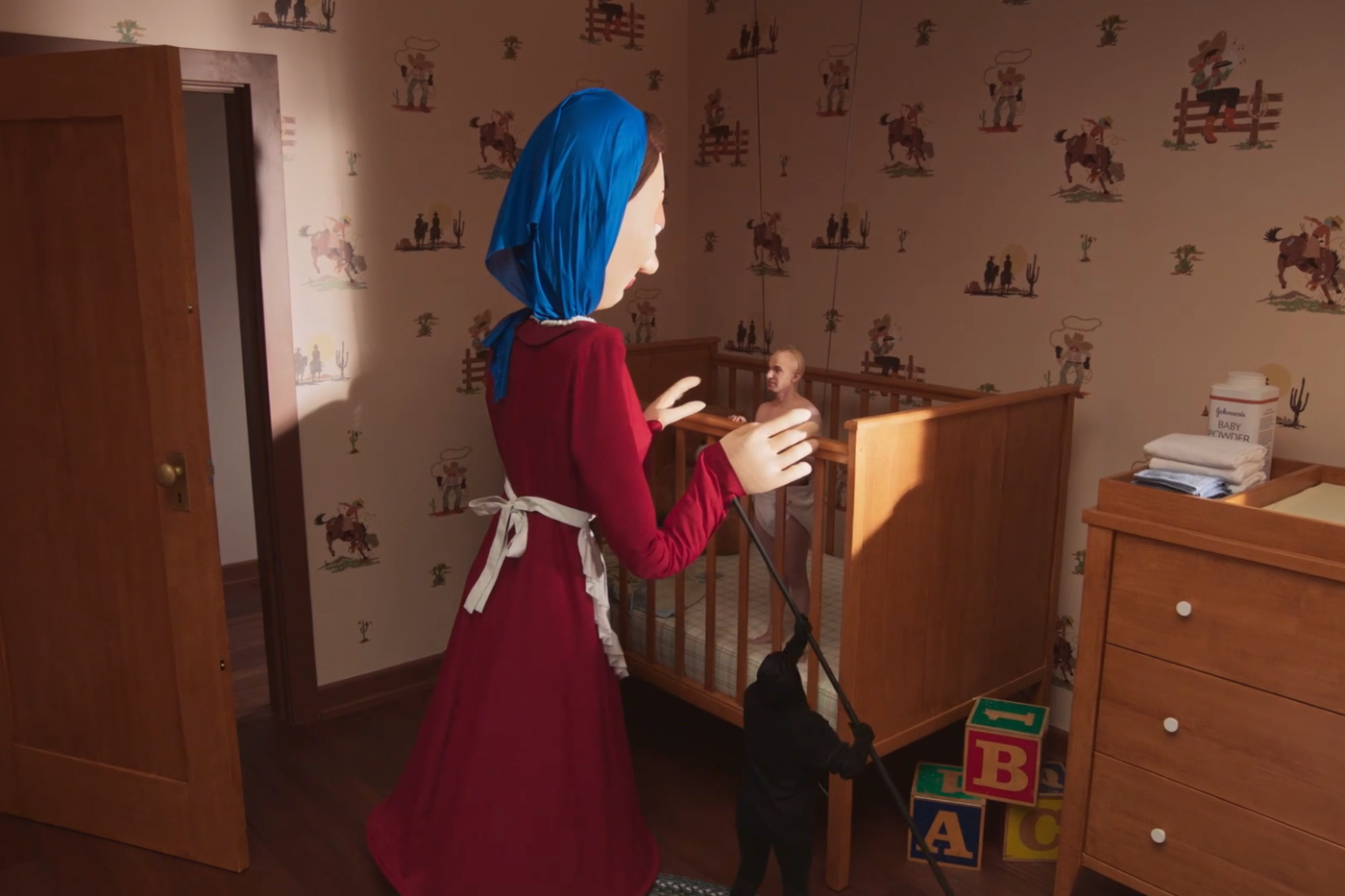Nathan Fielder Made a Better Sully Biopic Than Sully


An investigative documentary about preventable human error in commercial-airline crashes. A couples-counseling session. An experimental acting exercise. A reality-singing competition. A closely observed examination of male loneliness. A Mel Brooks–style Nazi satirical farce. In just the first two episodes of The Rehearsal season two, Nathan Fielder has proven to be a sexy bad boy of premium TV, bravely veering into whatever damn genre he pleases in pursuit of his great experiment, great entertainment, and a favorable “9” judge’s score. It works, and it never veers into being too zany, because everything onscreen is in service of the series’ overarching mission. Fielder is taking a serious problem that he seems genuinely invested in — changing air-travel safety-training standards on a federal level — and tackling it as he would a struggling local business on Nathan for You, full of comedic side quests and implausible runaround solutions. The result is a Sunday-night HBO series to tune into where you never know what will happen. Episode three, “Pilot’s Code,” takes Fielder’s Rube Goldberg approach to pilot safety to another level entirely, as his latest experiment in genre and episode structure produces some of the most captivating Fielderian imagery of all time, right up there with the Claw of Shame and his final moments on The Curse. It’s all part of something that haters say could never be done: Nathan Fielder genuinely made a better Sully Sullenberger biopic than Sully. And I really like Sully!
During the first half of “Pilot’s Code,” Fielder runs a season-one style rehearsal for a California couple with a very specific issue: After their beloved Yorkshire terrier, Achilles, died, they shelled out six figures for three Achilles clones, but despite sharing the DNA of the original dog, the clones lack his sparkling personality. Fielder builds a replica of the couple’s old apartment, casts actors to play the couple’s younger selves, and recreates the conditions in which they raised Achilles in an attempt to rewire one of the clones to develop a more Achilles-like personality. All of this turns out to be Fielder running animal testing before performing an experiment on himself: He wants to test his hypothesis that if a pilot can be raised in conditions that mirror those that produced famed hero pilot Chesley “Sully” Sullenberger, he will become just as intuitive, communicative, and thoughtful a pilot in a time of crisis. So he attempts to live a simulated version of Sully’s life, and the end result is sort of a mini-biopic.
Sully, Clint Eastwood’s 2016 retelling of the Miracle on the Hudson, is based on Sullenberger’s 2009 memoir, Highest Duty: My Search for What Really Matters, co-written with Jeffrey Zaslow. On The Rehearsal, Fielder also adapts the same source text, and it’s fascinating to see how his approach differs from the film. Fielder combs the text not just for autobiographical details, but for a glimpse into Sullenberger’s psyche, searching for revealing particularities in what Sullenberger chooses to focus on in the book and how he recounts it. Whereas the film eschews any lead-up to the events of January 15, 2009, Fielder homes in on one particular line from the book: “Flight 1549 wasn’t just a five-minute journey. My entire life led me safely to that river.”
Fielder takes this very literally and decides to experience Sully’s life from infancy to the moments after he landed in the Hudson. Cue the Baby Sully sequence: Fielder looks weird enough in a bald cap and oversize diaper, but then the camera reveals the massive bedroom set he’s walked into, where the crib, door, and dresser are modeled to a giant’s scale to make Fielder look like the size of a baby. It’s trippy, and it only grows more bizarre as the giantess Mother Sully puppet walks in, changes his diaper, powders his ass, and breastfeeds him from a papier-mâché’d teat, with Fielder choking on and spitting up the milk. This is audacious filmmaking! Fielder straight-up looks like Gummo, and the puppetry and playing with scale are like something out of a Michel Gondry movie. This is Fielder’s Eternal Sunshine; Tom Hanks would never shave his whole body down, wear an adult diaper, and get breastfed by a horrific Spitting Image puppet! What would Rita and the kids think?!

This whole sequence runs on dream logic, and that continues as Fielder’s Sully grows from baby to boy while his domestic 1950s world shrinks slightly to meet him. Now, Sully’s parents are played by human performers on large stilts, and his toddler sister is played by an actress in a repulsive, frightening mask. (Is this what Fielder thinks children look like in his mind’s eye? Chilling.) These are the sort of big interpretive swings that the most interesting biographical films are made of; think Robbie Williams portraying himself as a dancing monkey in Better Man. Lest you think Fielder is just doing crazy shit for crazy shit’s sake, he also honors traditional biopic beats, from Sully’s teen years, to his marriage, to a pivotal moment in the pilot’s lounge (a mythical space to Fielder, as established in the first episode), where a young Sully walks in on all the other cool pilots doing drugs and turns them down like the fine upstanding future hero he is. “So now you’re gonna rat us out? What about the pilot’s code?” one of the pilots ask him, like a bully in an afterschool special. “My only code is safety,” says Sully.
All of this is played with total sincerity by Fielder, accompanied by two voice-overs — one reciting the memoir, offering Sully’s thoughts in his own words, and the other, occasionally, from Fielder, same as how he narrates the rest of the show. Contrast this with Eastwood’s film, wherein Hanks’s performance is similarly reserved; his Sully is a man of few words, dumbfounded first by the emergency and then by the spotlight thrown on him. His Sully is unknowable, whereas Fielder’s is illuminating. It’s been said that Fielder’s great gift is how he is able to focus in on a subject until they reveal themselves to be truly the weirdest person alive — think of the numerology guy from season one or the pilot banned from all dating apps just last week. With Sully’s memoir in his hands, he finds the idiosyncrasies, the sorts of things that would never have even been considered for the Hollywood version of this movie, and transforms them into defining arcs and plot points.
Fielder is especially fixated on Sully’s relationship with music, something that could not have been less of a topic in Eastwood’s film. If I was going by the movie, I would think Chesley Sullenberger lived in a little hermetic pilot world of quiet and dignified masculinity, given how stunned he seems by the media glitz of New York. But Fielder hones in on the parts of his memoir where Sully buys his first iPod, then begins to name-drop Evanescence; the former gets constant mentions after Sully’s father’s death, and the latter is mentioned more than any other band in the book. Both of these insights, for Fielder, illustrate something deeper and more intimate about Sully: The introduction of the iPod gave him “a way to understand his feelings through lyrics”; and Evanescence’s biggest hit, “Bring Me to Life,” is a song Amy Lee once described as “a cry for help” about “no longer hiding your true self, as imperfect as it may be.” While the Sully-Evanescence jogging montage that follows might be played for laughs, Fielder is also unfurling his theory even wider: Thanks to music, Sully found a way to escape the prison of all-American masculinity and get more in touch with his feelings and “true self,” which would give him the humility not only to ask a first officer for help, but to perform a life-saving water landing.
The climax of this biopic in miniature, of course, is the crash, which, like Sully, dramatizes the cockpit transcript from the real-life event with word-for-word detail. Fielder wants to draw attention to how Sully asked his first officer, “Got any ideas?,” a moment that contrasts with the very breakdowns in communication the season is built around. If his whole life had been leading up to that question, then Fielder takes extra care with Sully’s 23 seconds of silence leading up to it. What was going through his head? There’s no way of knowing, but Fielder notes that Sully’s iPod was found in the flooded cockpit after the crash: “It might be nothing, or just a hunch I have from living with him for so long, but the chorus of Evanescence’s ‘Bring Me to Life’ just happens to be 23 seconds long.” Boom! In that moment, not only does Sully nail the landing, but so does Fielder. It’s a dramatic leap and act of historical interpretation, but one that leads to a perfect payoff. There is an almost zero percent chance that this is what actually happened, but this is a mini-biopic in which Fielder, dressed as Teen Sully, jacks off in an airplane simulator next to a robot. It’s not vérité, but it gets at a deeper truth.
And one more thing! I think the wife character is genuinely better written in The Rehearsal’s adaptation of the Sully memoir than in Sully. In Eastwood’s film, the wife’s only job is to occasionally be on the phone with Sully, watching the news and going, “Sully, I love you, Sully. Because I am your wife, Mrs. Sully!” It’s a waste of a perfectly good Laura Linney. But in “Pilot’s Code,” Mrs. Sully is a much more fleshed-out character who has realistic arguments with Sully while jogging or in the car. You get a better sense of their life together. Wives are often the worst-written, most short-shrifted part of any historical biopic, and this one is still cliché. But against all odds, she’s still more three-dimensional.
I’m sure Fielder watched Sully leading up to The Rehearsal’s second season. Some shots look, to the well-trained Sully fan’s eye, like direct homages to the film. There’s a line in the movie in which a character literally says, “I have read countless CVR transcripts of deceased pilots, and I have significant accident investigation experience.” That’s Nathan! Maybe his love letter to Sully is also, in its way, a love letter to Sully. It’s certainly a beautiful use-case for Evanescence. And it deserves its place alongside Monsters Inc., Avatar, and Sully as one of the Great American Films About a Sully.
Related

Latest News
For Sale! 2016 Sea Ray 350 Sundancer – $180,000
Reel Deal Yacht is pleased to feature a meticulously maintained 2016 Sea...
Indulge in Luxury Living at the Upcoming Wine & Design Event
Experience Luxury Living at the Final Spring Wine & Design Event On...
Club Offers Announced on May 18, 2025
Travelzoo Unveils Exclusive Club Offers for Travel Enthusiasts LONDON, May 17, 2025...
Promoter’s Caution could add random layer of chaos in NASCAR All-Star Race
The fate of the NASCAR All-Star Race largely rests on the whims...
Caitlin Clark says flagrant foul for shoving Angel Reese was not ‘malicious’
Caitlin Clark and Angel Reese agreed on one thing Saturday: Their minor...














Leave a comment